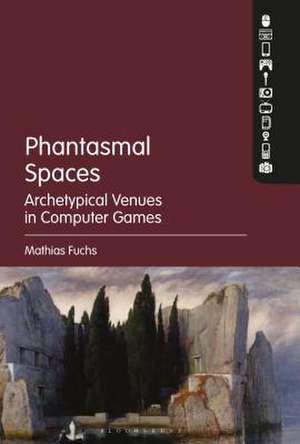Phantasmal Spaces: Archetypical Venues in Computer Games
Autor Professor Mathias Fuchsen Limba Engleză Hardback – 12 iun 2019
| Toate formatele și edițiile | Preț | Express |
|---|---|---|
| Paperback (1) | 215.61 lei 6-8 săpt. | |
| Bloomsbury Publishing – 23 dec 2020 | 215.61 lei 6-8 săpt. | |
| Hardback (1) | 655.26 lei 6-8 săpt. | |
| Bloomsbury Publishing – 12 iun 2019 | 655.26 lei 6-8 săpt. |
Preț: 655.26 lei
Preț vechi: 942.39 lei
-30% Nou
Puncte Express: 983
Preț estimativ în valută:
125.40€ • 130.17$ • 104.56£
125.40€ • 130.17$ • 104.56£
Carte tipărită la comandă
Livrare economică 22 martie-05 aprilie
Preluare comenzi: 021 569.72.76
Specificații
ISBN-13: 9781501332920
ISBN-10: 1501332929
Pagini: 176
Ilustrații: 17 bw illus, 2 tables
Dimensiuni: 152 x 229 mm
Greutate: 0.43 kg
Editura: Bloomsbury Publishing
Colecția Bloomsbury Academic
Locul publicării:New York, United States
ISBN-10: 1501332929
Pagini: 176
Ilustrații: 17 bw illus, 2 tables
Dimensiuni: 152 x 229 mm
Greutate: 0.43 kg
Editura: Bloomsbury Publishing
Colecția Bloomsbury Academic
Locul publicării:New York, United States
Caracteristici
Provides a wide range of case studies and games references, from classics like Tomb Raider (1996) to the newly released No Man's Sky (2016)
Notă biografică
Mathias Fuchs is Professor at the Institute of Culture and Aesthetics of Digital Media at Leuphana University of Lüneburg, Germany. An artist as well as media scholar, Fuchs pioneered the artistic use of computer games and has exhibited work at ISEA, SIGGRAPH and the Millennium Dome. He is the editor of Diversity of Play (2015) and co-editor of Rethinking Gamification (2014).
Cuprins
Phantasmal Spaces: Introduction1. The RoadRoad Movies, Photography, Edward Hopper's RoadsDriving Games and Driving Game InterfacesPsychology of DrivingTransmedia Road Phantasms2. The RuinPainting DecayDigital DustSigmund Freud's Death Drive and the Opponents ThereofS.T.A.L.K.E.R. and Tarkovsky's Wastelands3. The CaveCave MenUnreal Tournament Design Philosophy, Boolean SubtractionsFrightened to DeathC-movies4. The CloudThe Beauty of Clouds and Industrial SteamCloud RenderingHead in the Clouds: DaydreamingTransmedia Cloud Formations5. The CliffRunning and FallingPhysics EnginesPsychology of Risk TakingLeaping from One Medium to Another6. The ForestNibelungen ForestsTree-GeneratorsThe UncannyTale of Tale of Tales7. The PortalDoors, Gateways, PassagesWarp ZonesRites of PassageDoors in Transmedia Spacetelling8. The IslandYou are Alone!Chiselling Mountains - Fetching Pretty SunrisesReally Alone!!!Robinson CrusoeAtmospheric Places: ConclusionReferencesLudographyIndex
Recenzii
Mathias Fuchs ventures into a fascinating range of art-historical, literary, film and philosophical references to analyse the function of archetypal experiences of various spatial environments commonly found in computer games.
A major new work in game aesthetics: Fuchs neatly sidesteps the stale isolationist dogma of game studies by treating videogames as entwined within the same cultural and psychological forces as other artworks. And about time too!
Mathias Fuchs's new approach to the analysis of computer games makes us aware of how much of the spaces occupied by players are in fact dreamscapes, places of phantasmal qualities. The book aims way beyond the 'spatial turn' in game studies and approaches spaces as lived-in phantasms. Full of insights and surprising observations, Phantasmal Spaces is a complex yet widely accessible contribution to the study of our own imagination in times of digital media.
A major new work in game aesthetics: Fuchs neatly sidesteps the stale isolationist dogma of game studies by treating videogames as entwined within the same cultural and psychological forces as other artworks. And about time too!
Mathias Fuchs's new approach to the analysis of computer games makes us aware of how much of the spaces occupied by players are in fact dreamscapes, places of phantasmal qualities. The book aims way beyond the 'spatial turn' in game studies and approaches spaces as lived-in phantasms. Full of insights and surprising observations, Phantasmal Spaces is a complex yet widely accessible contribution to the study of our own imagination in times of digital media.
